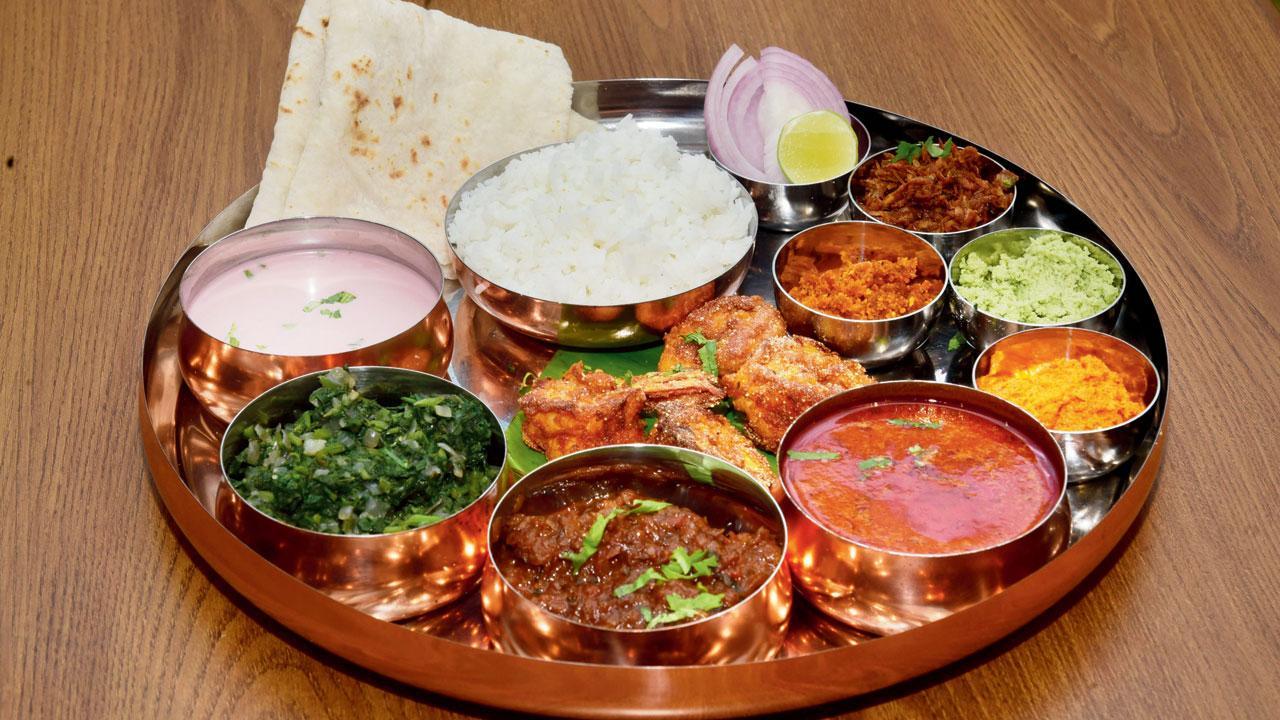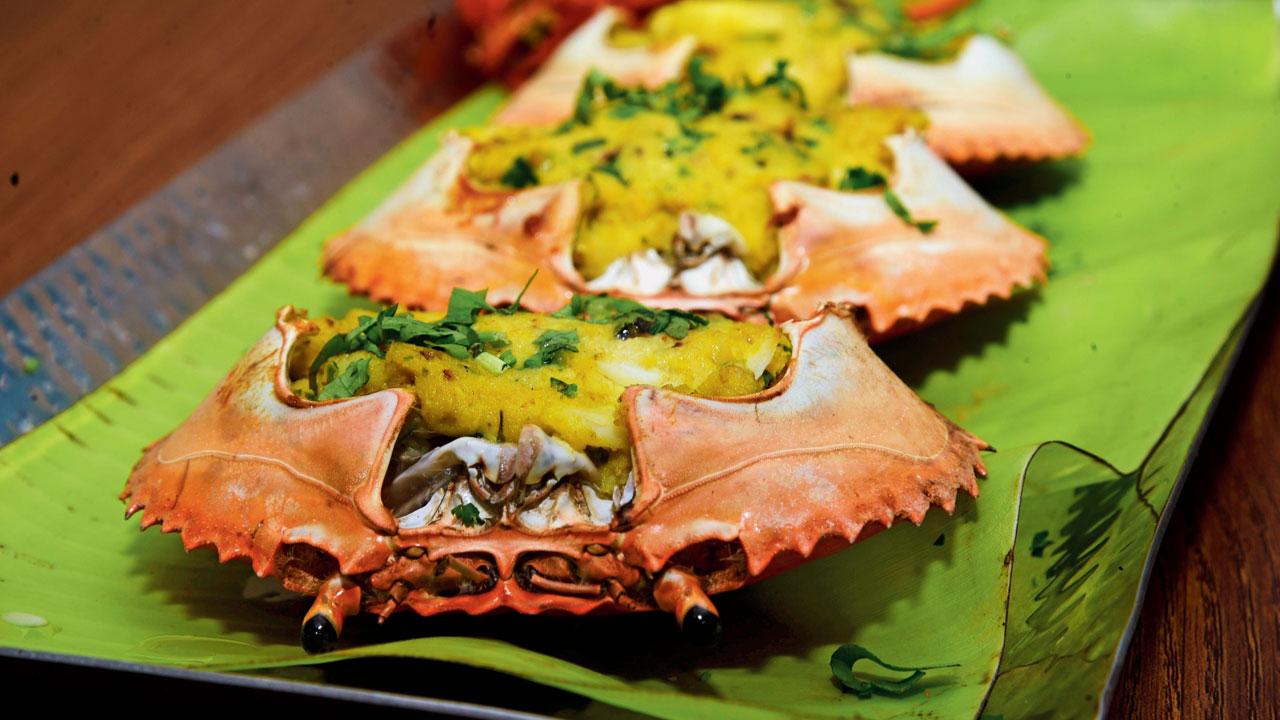Espousing a home-styled, nutrition-focused and freshness-first attitude, this new seafood restaurant in Andheri intends to give the ubiquitous pomfret and surmai a break

Representation Pic
Tucked among storefronts on a busy pavement on New Development Road in Andheri East is The Mackerel Story, a month-old seafood restaurant espousing a freshness-first mantra. As we push past the glass doors under its blue nautical logo of two anchors and a model of the fish that lent the eatery its name, the ample green of the interiors—the chairs, the booths on one side, the foliage-inspired wall art on the left—are a relief to the eyes after the glaring sun outside.
ADVERTISEMENT
Dressed in smart casuals with cropped hair, owner Bhakti Muslunkar is waiting for us accompanied by chef Prasad Parab, who has helped design the concept and curate the menu of the restaurant. Muslunkar owns a farm in Guhagar, about six hours by road from Mumbai, where she grows turmeric, kokum, cashews, mangoes, pineapples, cabbage, capsicum, rice, nachni, khapli wheat and jowar. “We source 70 to 75 per cent of our ingredients for the restaurant from the farm which are produced without the use of chemicals,” she tells us.

Bhakti Muslunkar and her son Kshitij were keen to start a restaurant that offered the taste of homestyle food and fresh catch
The idea of the restaurant grew out of a need to offer nutritious food with the taste of homestyle cooking that was “not boring”, and fresh fish that is bought each morning. A major contributor to this last part, we learn, is Shivpoojan who we meet at the restaurant and who has been buying fish for the Muslunkars for the past eight years, scouring the markets at Bhaucha Dhakka, Sassoon Docks, Crawford Market and Naigaon as early as 4 am every day.
“Most restaurants have a ready-made curry served with fish such as rawas, prawns, pomfret and surmai. We decided to oppose that, choosing instead to serve separate curries for each type of fish to bring out their flavours,” Parab tells us. A decision was also made about only serving the fresh catch of the day and not feeling compelled to serve all customers who turned up by offering them frozen fish once the fresh stocks had run out.
As a result, the number of thaalis that are served on a day is limited, and Parab helpfully offers that the best thing to do is to call in advance to inquire about the availability of the kind of seafood one would like to eat. Muslunkar’s son Kshitij, a BBA student who has now joined the family jewellery business, informs that this is their second restaurant venture after Nav Kayastha Pangat in Ville Parle East which serves authentic CKP cuisine. There are also plans to open a third seafood-focused eatery in Marol later this year.
While the food tastings have been a highlight of the past month, the challenge for the owners has been to get the recruits in the kitchen to approach food differently by changing attitudes around ingredients and practices. Muslunkar has also been working with the local women at Guhagar to source fresh hand-ground masalas and cereals for the restaurant.
But why name the restaurant after the humble bangda? “Mackarel is a gareebo ka fish,” Parab agrees. “You don’t get it in Mumbai. Here, the poor mainly eat bombil and mandeli.” It is a delicacy in Malvan where he hails from and where it is eaten at home alongside other fish such as tarli and saundale.

The zafrani crab shells have a delicate balance of flavours and a 35-minute prep time. Pics/Atul Kamble
There is also an assumption, Muslunkar points out, that cheaper fish cannot be as good. “We realised that people in rural areas work for hours in the heat and eat mackerel which becomes a good source of protein. So we decided to introduce it here with ragi bhakris or ghavne, and neer dosa.” Their aim in the coming months, she says, is to serve small fish such as parva, kane and small bangda, which are usually eaten at home during the monsoons—and not pomfret or surmai.
In India, where mackerel is mainly exported, Parab also speaks of the need to create awareness around the dangers of overfishing. Citing the example of the Chilean government which has passed numerous regulations to protect at-risk species, including implementing restrictive fishing quotas and bans on harvesting and selling fish during breeding seasons, he speaks of the need to generate interest in other varieties. “I don’t know if my children are going to be able to eat pomfret in another 10 years. When we stop offering, people will stop eating.”
While we sip on a light kokum drink, the first item to be brought out is a plate of tandoori crab momos (Rs 599) made of whole-wheat flour, where the momos are steamed first and then placed in the tandoor. It’s a bestselling dish, we are told, but we prefer the zafrani crab shells (Rs 759) with its delicate balancing of flavours. The item has a 35-minute prep time during which the crabs are cut, cleaned, marinated, roasted in a tandoor, and broken to retrieve the soft meat that is placed in the shells and put again in the oven. It can’t be made in advance as crabmeat turns rubbery. “People will just have to wait for some things. It’ll be no fun if it’s not fresh,” Parab tells us. We also try the Multani crab claws (Rs 459) which are creamy and yet unexpectedly light, but somewhat difficult to manoeuvre in a restaurant.
The Malgudi mackerel (Rs 299), surprisingly one of only three mackerel items on the menu, arrives next, caked lightly in a garlic, madras onion and curry leaves tawa fried masala, inspired by the flavours of Telangana, Karnataka and Kerala. Byadagi chillies add sweetness and give the dish its bright red colour. We move on to some crispy spinach prawns (Rs 595)—an item not on the menu but recommended by staff based on customer taste—which pleasantly balances the sweetness and softness of the prawns with the crunchy saltiness of the spinach.
The last stop is the surmai thaali (Rs 499), an elaborate fare with both fried and curried surmai, served alongside wholesome palak bhaaji, rice, rice/jowar/nachni bhakri, three types of chutney—mint, raw mango and dried coconut with peanuts—and a fragrant solkadi. There is aamras for dessert, made with mangoes from Muslunkar’s farm. Since people prefer not to eat milk-based foods after seafood, there are plans to introduce appe, made of rava, coconut and sugar, gehu ki kheer, and patole with fresh coconut and jaggery in banana or turmeric leaves. Muslunkar has thus far refused to have gulab jamun or shrikhand on the menu as they are far too common and has also resisted the inclusion of cold drinks although the younger customers keep asking for them. “People need to stop consuming those things,” she laughs.
WHERE: Shop No.1, New Develop-ment Road. Opp Takshila Society, Gate No.2, Andheri (E)
 Subscribe today by clicking the link and stay updated with the latest news!" Click here!
Subscribe today by clicking the link and stay updated with the latest news!" Click here!







